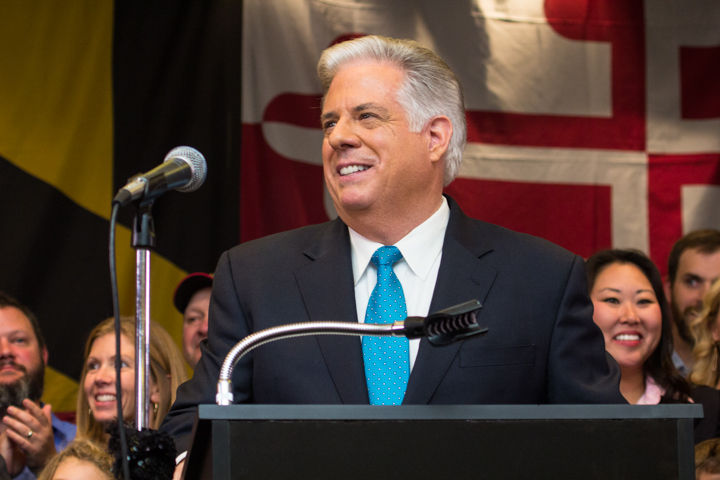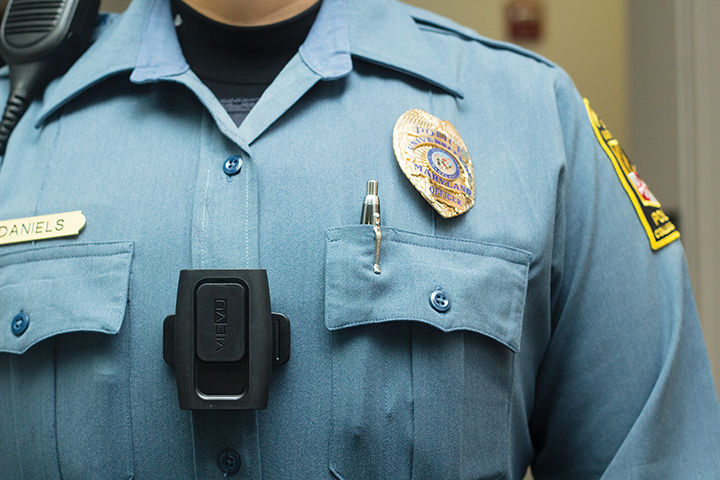Gov. Larry Hogan signed 350 bills into law Tuesday morning focusing on improving the state’s law enforcement practices, business climate and college access.
The bill signing had been scheduled for April 28, but following the riots in Baltimore, Hogan spent most of the past two weeks meeting with community groups in the city and waiting for the situation to calm down before returning to his normal schedule.
The two-part bill signing took place Tuesday morning, according to a news release.
Hogan signed a number of bills aimed at improving law enforcement practices, a contentious topic after the death of Freddie Gray and the ensuing unrest in Baltimore.
To improve police accountability, Hogan signed a bill to allow police departments across the state to use body cameras. The practice had come into question because recording audio of someone without their permission is against state law, but this bill creates an exemption for body cameras, allowing officers to intercept oral communication.
Sarah Love, spokeswoman for this state’s American Civil Liberties Union, said the ACLU is “disappointed” in the bill, because it doesn’t require police to notify people that they are being recorded.
“One of the reasons people want body cameras is to change behaviors,” Love said. “We’ve seen in other jurisdictions that have them, complaints against law enforcement go down, law enforcement behave better and civilians behave better. But they can only do that if they know they are being recorded.”
Another bill aimed at curbing racial profiling requires police officers to record certain information about traffic stops, including the race of the individual. They will have to report the information to state agencies so they can determine if police have a racial bias.
Hogan also signed a bill requiring police departments to submit information on any deaths involving law enforcement officers, both when police officers use deadly force against civilians and when officers are killed in the line of duty, to the Governor’s Office of Crime Control & Prevention.
The GOCCP will have to submit annual reports to the General Assembly, so they can have a better sense of the circumstances and patterns surrounding police-related deaths.
“These bills directly address public safety and community relations issues, including the day-to-day operations of our law enforcement officials,” Hogan said in a news release. “Ensuring the safety of our citizens will always be a priority of our administration, and I am proud to sign these bills into law.”
The new laws will create a grant program for low-income people looking to attend college, create a framework for ride-sharing apps in the state and improve police accountability.
Hogan signed the “Uber bill” to create a permanent framework for ride-sharing apps in the state. The bill had initially drawn harsh criticism from taxicab companies as well as the Public Service Commission for its lack of state oversight on drivers.
After several rounds of negotiations, bill sponsor Sen. Bill Ferguson (D-Baltimore City) amended the legislation to add more regulations for ride-sharing companies but still create a lasting way for them to operate in the state.
The bill creates a new regulatory classification for transportation network companies like Uber and requires drivers obtain licenses with the Public Service Commission. All parties involved supported the final version, which was pushed through several procedural hurdles on the final day of the legislative session.
“This decision marks a huge win for riders and drivers across the state who now have permanent access to safe, reliable rides and the jobs they create,” Uber spokesman Taylor Bennett said.
To help low-income residents attend college, Hogan will sign Del. Alonzo Washington’s (D-Prince George’s) bill to create a state grant program for nonprofits that provide scholarships and guidance to high school students looking to continue their education.
The bill creates a two-year pilot program, and while no funding was appropriated in the fiscal year 2016 budget, Washington is confident Hogan will provide significant funding next year and make the program permanent after seeing its success.
“It’s a very tight budget this year,” Washington said. “We wanted to make sure he had the opportunity to at least establish the program first and add funding in later years. In the interim, I’m going to do a lot of advocacy to ensure that there is funding in the governor’s next budget for the program.”
Gov. Larry Hogan gives his acceptance speech at the gubernatorial election watch party held in Annapolis on Nov. 4, 2014.




